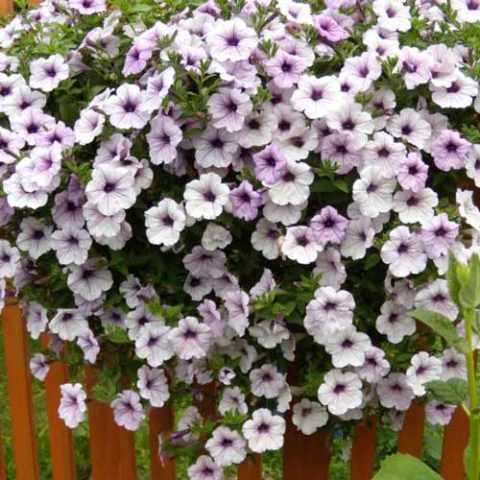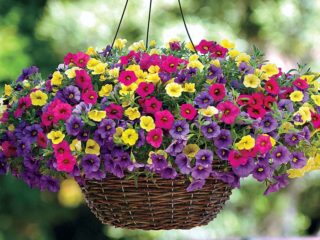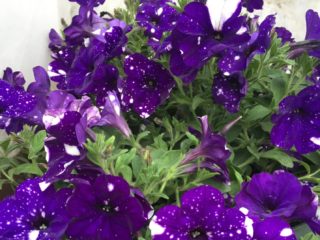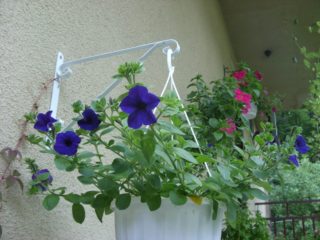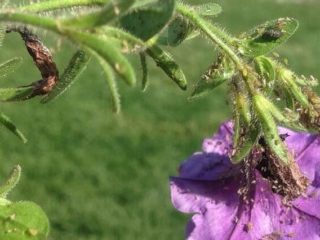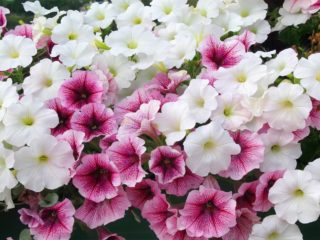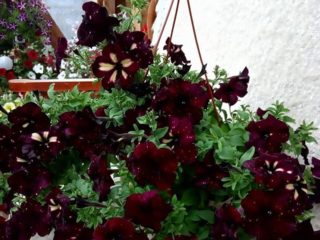Content
Petunia Typhoon is a bright hybrid variety, popular and beloved by many gardeners. These large and vigorous plants have an extraordinary variety of inflorescences and a unique aroma. Typhoon varieties delight with magnificent flowering throughout the summer season, are unpretentious and firmly endure the atmospheric whims of nature.
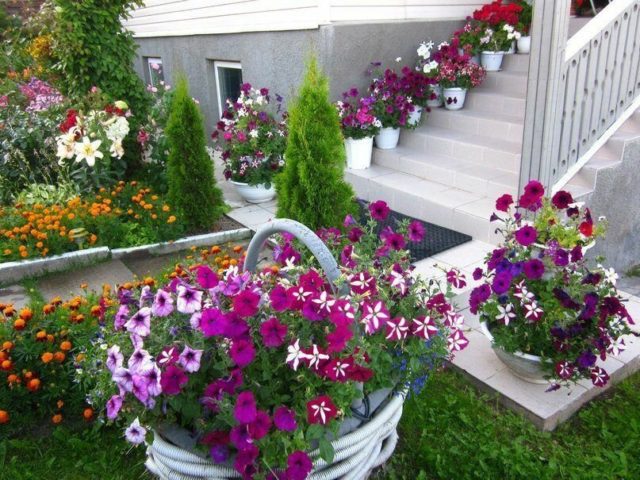
It is better to place large petunias in flowerpots on flower beds, and small ones on stairs
Description and characteristics of petunia
Petunias have large stems, flowers up to 10 cm. Seedlings are planted in March / April, the recommended distance between plants in a flower bed is from 1.5 m. The optimum temperature for growth is + 24 ° C.
Varieties of petunias of the Typhoon series
Among the varieties of large petunias, one of the most popular is the hybrid type Typhoon. Plants are much more hardy than other varieties, they have a sweet pleasant smell that scatters around the flower at a distance of several meters, as well as large bright flowers of the most beautiful tones - soft white, pink, red.
In addition, this Typhoon variety is immune to such a malign disease as powdery mildew, therefore, it does not require increased care and treatment with fungicides.
The undoubted priority in choosing Typhoon petunias is their fast germination and an increased flowering period until the first snow. In addition, petunia blooms earlier than other varieties.
Giant cascading petunia Typhoon F1 Red Velor
It is the tallest of all species (height reaches 50 cm). It will require flowerpots with long pendants. The color can be different - both pinkish and dark purple or bright red. The species is resistant to fungi and other microbes, so it is suitable for indoor and garden cultivation.
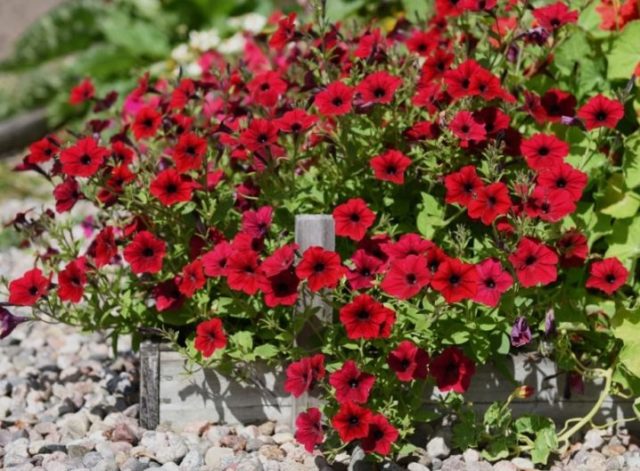
The bright color of Red Velor is emphasized by white flowerpots or light gravel
Giant Cascade Petunia Typhoon F1 Hot Pink
The hybrid bushy series of petunias, Typhoon Hot Pink, is characterized by a bright scattering of flower buds, predominantly pink. The inflorescences are large, up to 7 cm in diameter. Typhoon Hot Pink variety perfectly tolerates heat and moisture thanks to its strong rhizomes. The stems of Hot Pink petunia plants are up to 80 cm, and the flowering period is up to frost. The seedlings of petunia take root well in the ground, and already 2 weeks after planting they please with a uniform pink flowering.
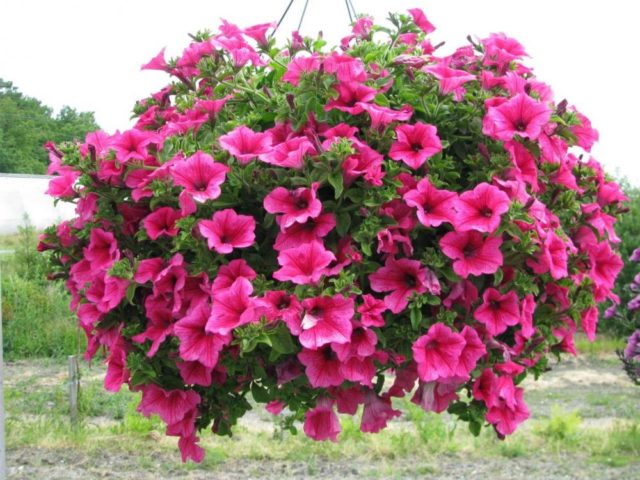
Petunia Typhoon Hot Pink is recommended to be planted in suspended lawns
Giant cascading petunia Typhoon F1 Silver
The most striking varietal variety is the ampelous petunia Typhoon Silver. The species is very resistant to bad weather, quickly renews itself after rains, and blooms before frost. The gorgeous bush of the plant forms an extensive stem array and in the presence of open space or spacious dishes, the Silver bush can grow up to one and a half meters wide. The flowers of the plant are pale pink or white. Differs in the longest flowering time (from the beginning of summer to the onset of the first autumn frosts). Due to its characteristics, it tolerates dry weather very well. Doesn't require frequent watering.
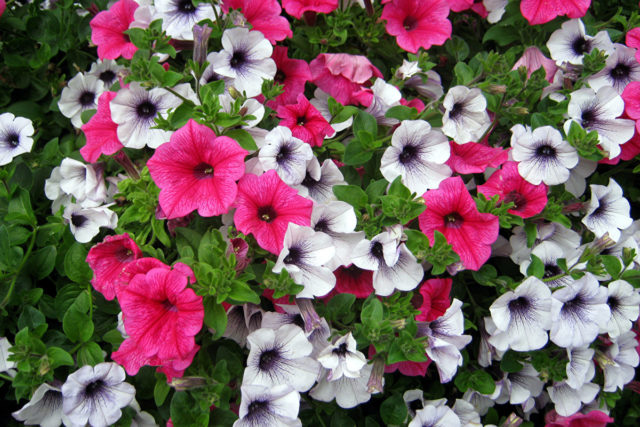
Petunia Silver is an elegant mix of colors for a balcony design.
Cascade petunia Typhoon F1 Cherry
The flowers are reddish or bright pink, the stems are bushy, hard. The plant has a high growth rate, so if planted in an open area, then in a short time they can fill a wide area. The root system is strong, so if you use a flowerpot or pots, then you should take care of the capacity of the container in advance. For abundant flowering, it is recommended to plant Typhoon cherry plants in a sunny place. The species is excellent for growing in the garden, large baskets and containers, and can also be used as a ground cover.
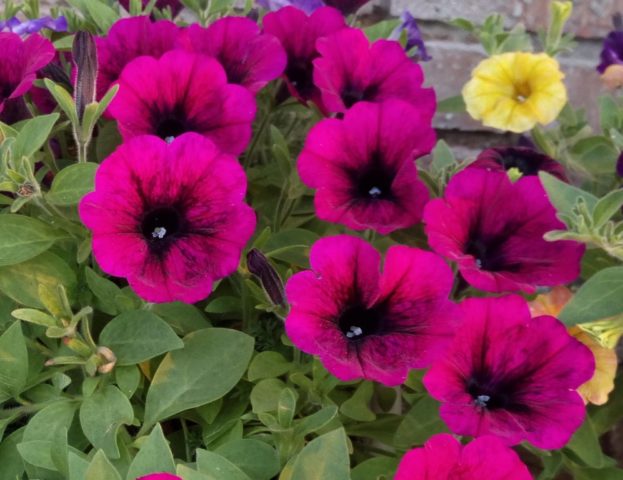
Petunia Cherry decorates large squares
Features of planting and care
The most common method for breeding Typhoon petunias is sprouting seedlings from seeds. For this plant, it is very important to use prepared soil, which can be purchased from specialized stores. If the purchase is not possible, then it is easy to make it at home by mixing humus, sand, peat and a little turf. Below is a step-by-step guide for planting petunias:
- to the bottom of the container in which the flower will grow, pour a layer of expanded clay;
- pour a layer of soil on top;
- spill everything well with water;
- spread out the change on the top layer of the earth;
- using a spray bottle, moisten;
- cover the container with a transparent material (polyethylene, cling film or glass) to create a greenhouse effect.
It is very important to observe the climatic regime in the room where the container with plant seedlings will be located. The temperature should not be less than 20 degrees.
Seed sowing dates
It is generally accepted that the planting dates for the Typhoon petunia refer to the end of March, after the vernal equinox, when the daylight hours become longer. The first shoots are usually formed after about 2 weeks. Diving of sprouts must be done not earlier than the appearance of two leaves on the stem. In order to avoid situations of frostbite of plants and not to endanger the seedlings, it is advised to plant the Typhoon petunia in the ground in late spring or early summer.
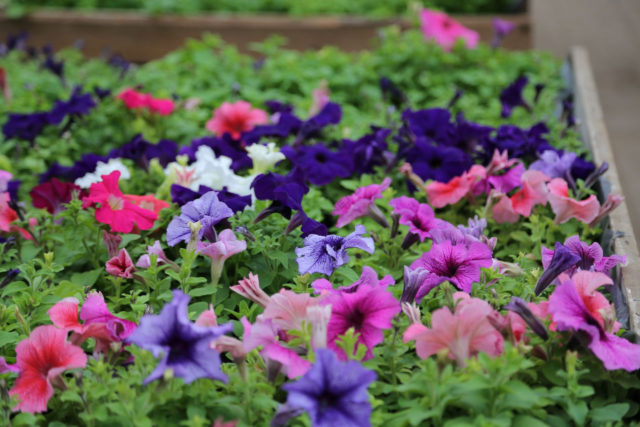
Saplings of petunia Typhoon bloom very early
Soil and site requirements
Petunia is not as whimsical to the soil composition as many plants, but it should not allow soil oxidation above pH-5.5.
The fertilizers applied must necessarily contain an increased percentage of nitrogen, this has a beneficial effect on the Typhoon variety and allows for abundant flowering. The time for feeding with nitrogen is the 1st half of the summer. Towards the end of the season, you need to fertilize with a phosphorus-potassium complex.
For planting in a home container, pots or outdoor hanging baskets, the land mixture is made according to the following recipe: 2 parts of sod / leafy soil plus 2 high-quality humus, 2 peat and 1 part of sand. Do not forget that with this method of planting, the soil dries out quickly. To avoid this, a hydrogel is added.
Due to its well-developed root system, the Typhoon variety easily tolerates transplanting. It is preferable to choose sunny and calm places for petunias.
Sowing seeds and aftercare
Sowing the seeds of the Typhoon petunia is produced at the end of March. General recommendations for the safe cultivation of Typhoon seedlings:
- do not pour petunia seeds with water to exclude fungal diseases;
- water only with boiled or settled water;
- 15 days after the emergence of sprouts, it is recommended to make top dressing;
- apply top dressing with every 3-4th watering;
- after the appearance of 2-4 sheets, dive into separate cups.
Advice recommended by agronomists: prepare a container with soil and level the surface, carefully lay out the seeds and cover with a thin layer of snow. When it grows, it will naturally compact the earth and fix small seeds.
Diseases and pests
This plant is characterized by the appearance of several types of parasites.
Spider mite, spreading at lightning speed between the inflorescences of the plant, infects the entire flower. It is very difficult to detect when it first appears due to its size. It becomes noticeable only after the plant is entwined with cobwebs, and white dots appear on the leaves. You can get rid of it with the help of acaricidal drugs ("Nero", "Demitan").
Thrips - small worms that settle on the seamy side of the plant's leaves. After the appearance of these parasites, the flower begins to dry out. They are not always noticeable immediately, but when whitish stripes appear on the leaves of the plant, the colonies of thrips have already thoroughly captured the flower. You can get rid of pests with the help of bioinsecticides ("Aktar", "Spintor-240").
Aphid Is a very common and most dangerous plant pest. When it appears, spots appear that look like sweet drops, which are gradually covered with a fungus with a bloom of soot. A way to get rid of parasites is bioinsecticides - "Aktara" and "Confidorm", or natural helpers, such as ladybugs, lacewings and flyworms. There is also a popular way: you need to fasten a piece of white paper with sweet and smelling syrup to the center of the plant on a clothespin, and during the day all the aphids will gather on the leaf.
How to place a Typhoon petunia in the garden
Typhoon varieties are a real flower garland with hundreds of beautiful inflorescences in a wide range of colors. Petunias will effectively decorate both a terrace, if you arrange them in hanging baskets or pots, and a flower bed near a house, street store or cafe.
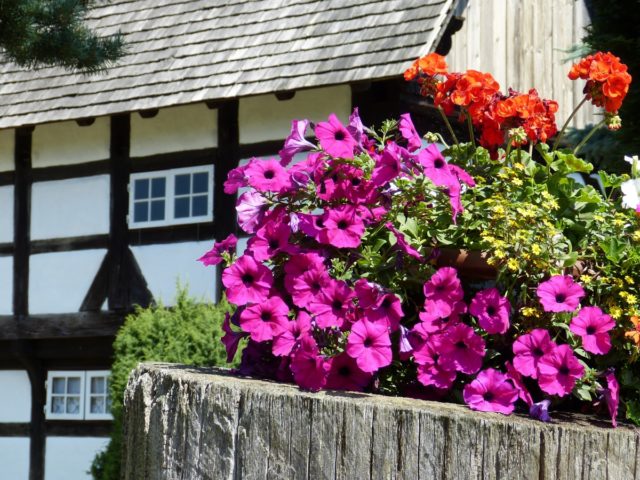
Petunias go well with many flowers
Another favorite way of growing plants for urban aesthetes is in balcony boxes. Given the unpretentiousness of petunias, they can be placed inside a house or cottage.
Typhoon bushes are an amazing decoration of any landscape. Petunia looks incredibly beautiful in portable pots, which can be placed, for example, on both sides of the front door. Some are installed on the steps of the stairs, if the width allows. Such flowerpots are easy to carry, they can, if necessary, decorate individual landscape zones. For example, pots of petunias are transferred to the central alley of the dacha when wedding parties are planned.
Blooming Typhoon petunias will magically change any corner of a country house or a balcony of a city apartment. There are a huge number of options, as well as color schemes.
Conclusion
It is no coincidence that Petunia Typhoon fell in love with gardeners and designers. For more than a hundred years, many have been happy to decorate balconies, terraces, flower beds and parks with these amazing flowers. The Typhoon variety blooms brightly and luxuriantly almost before the onset of severe cold weather, is unpretentious, resistant to capricious weather.
